What is allusion and what is illusion?
... From Aleph to Taf
describes something from beginning to
end; the Hebrew equivalent of the
English 'From A to Z' ... Tav is
the last letter of the Hebrew word
emet, which means truth. The midrash
explains that emet is made up of
the first, middle, and last letters of
the Hebrew alphabet (Aleph,
Mem, and Tav...).
Sheqer (falsehood), on the other
hand, is made up of the 19th, 20th, and
21st (and penultimate) letters. Thus,
truth is all-encompassing, while
falsehood is narrow and deceiving. In
Jewish mythology it was the word emet
that was carved into the head of the
Golem which ultimately gave it life.
But when the letter 'aleph' was erased
from the Golem's forehead, what
was left was 'met' - dead. And so
the Golem died ...

... According to Metoro something new
was beginning with Bb11-18, this we can
read from his Capital letter. 225 + 1 =
436 - 210 = 226 ...
|
ka oho te Rei |
|
Tagata itiiti - ma to
kava |
kua moe te goe |
erua ra manu - kua
oho |
- |
13 |
 |
 |
 |
 |
 |
|
Bb11-17 (4 * 214) |
Bb11-18 (436) |
Bb11-19 (421 + 437) |
Bb11-20 (859) |
Bb11-21 (4 * 215) |
|
Goe. Milky Way.
Vanaga.
Moe. To
sleep, to lie at full
length, to dream, to
brood, to place, to
cohabit; moe atu,
to leave off, to desist;
moe atu ra, to
adjourn, to postpone;
moe hakahepo, to
talk in the deep; moe
aherepo,
somnambulist,
sleepwalker; moe
hakataha, to
sleep on the side;
moe no, to
oversleep, concubinage;
moe tahae, to be
a light sleeper; moe
tahaga, a
sleeper; moe vaeahatu,
moe hakaroa, to
sleep sprawling; rava
moe, to sleep sound;
ariga moe ki
raro, to lie flat on
the ground; tae moe,
bachelor; hakamoe,
to brood, to fold the
wings; to reserve, to
lay up; to struggle. P
Pau.: moe, sleep.
Mgv.: moe, sleep,
to lie down, coitus, to
shut the eyes. Mq.:
moe, to sleep, to
lie down; haŠmoe,
to set down on the
ground. Ta.: moe,
to sleep, to lie down.
Moea raruga,
lying flat. Moeaivi,
thin. Mq.: ivi,
haŠivi, id. Ta.:
ivi, id. Moega,
mat. Pau.: moehega,
bed. Mgv.: moega,
a sleeping mat. Mq.:
moena, moeka,
mat, floor cloth, bed.
Ta.: moea, bed.
Moemata, to sleep
with the eyes open;
mea moemata,
phantom. Moemoea,
a dream, vision;
tikeahaga moemoea,
apparition by night. T
Mgv., Mq., Ta.:
moemoea, dream.
Churchill. Mgv.
Moemoe, to steal, to
purloin at a food
distribution. Mq.:
moemoe, to seize, to
grasp. Churchill. Ta.:
1. Moemoe,
ambush. Ha.: moemoe,
id. 2. Moemoe,
Phyllanthus simplex.
To.: mohemohe, a
tree. Churchill. Mq.:
Moehu, exiled,
banished, prisoner of
war. Ma.: morehu,
a survivor. Churchill.
111 * 8 = 888. 43 * 6 = 452 = 436 + 16 =
457 - 21. 1118 - 108 = 1010
→ 10 times
right ascension day 101 as the position
of Sirius - always in June 30 (181).
1001 = 7 * 11 * 13. The idea of one more
characterizes proliferation and life (emet).
...
Up to the present time,
fertility spells for
fowls have played an
important role.
Especially effective
were the so-called
'chicken skulls' (puoko
moa) - that is, the
skulls of dead chiefs,
often marked by
incisions, that were
considered a source of
mana. Their task
is explained as follows:
'The skulls of the
chiefs are for the
chicken, so that
thousands may be born' (te
puoko ariki mo te moa,
mo topa o te piere)
... As long as the
source of mana is kept
in the house, the hens
are impregnated (he
rei te moa i te uha),
they lay eggs (he
ne'ine'i te uha i te
mamari), and the
chicks are hatched (he
topa te maanga).
After a period of time,
the beneficial skull has
to be removed, because
otherwise the hens
become exhausted from
laying eggs ... |
| ka tu te Rei - a matagi |
ma te hokohuki - ma te ua |
hakatu te Rei a matagi |
ma te hokohuki ma te ua |
ihe haki tua pu |
|
Haki. Certainly. Churchill.
Tua. 1. Back, shoulder, tu'a ivi, shoulder blade; tu'a ivi more, lumbago; moa tu'a ivi raŠ, 'sun-back chicken': chicken with a yellow back which shines in the sun. 2. Behind (a locative adverb, used with i, ki, a, o, etc). Tu'a-papa, pelvis, hips. Vanaga. 1. Behind, back, rear; ki tua, after; o tua, younger; taki tua, perineum. 2. Sea urchin, echinus. The word must have a germ sense indicating something spinous which will be satisfactorily descriptive of the sea urchin all spines, the prawn with antennae and thin long legs, and in the Maori the shell of Mesodesma spissa. Tuaapapa, haunch, hip, spine. Tuahaigoigo, tattooing on the back. Tuahuri, abortion; poki tuahuri, abortive child. Tuaivi, spine, vertebrś, back, loins; mate mai te tuaivi, ill at ease. Tuakana, elder, elder brother; tuakana tamaahina, elder sister. Tuamouga, mountain summit. Tuatua, to glean. Mgv. tua: To fell, to cut down. Ta.: tua, to cut. Mq.: tua, to fell, to cut down. Ma.: tua, id. Tuaki, to disembowel. Ma.: tuaki, to clean fish. Tuavera, the last breadfruit spoiled by the wind. Ta.: tuavera, burnt by the sun. Churchill.
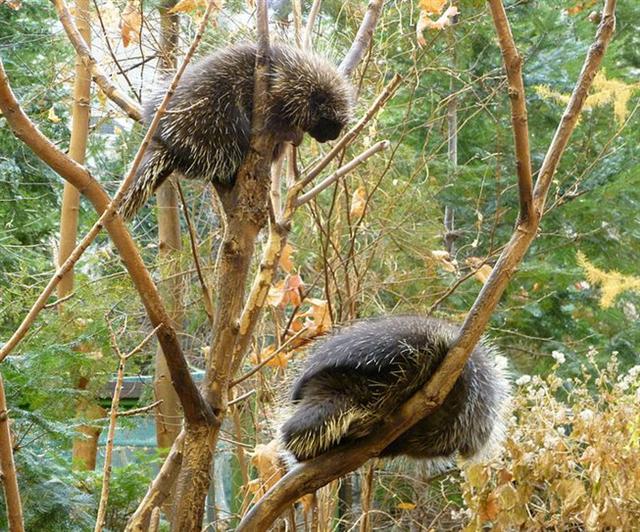
|
 |
 |
 |
 |
 |
| Bb11-35 |
→ 11 * 36 = 396 |
Bb11-37 (355 + 100) |
Bb11-38 (19 * 24) |
Bb11-39 (436 + 21) |
|
... there had been a 'year of chaos', viz. the year with 455 [45 * 5 = 91 and 220 = 4 * 55] days created by Caesar in order to obliterate the arbitrary decisions of the clergy making the years too long if the ruler was in favour and making the years too short if he was not ... ... Anyhow, the antagonism between rain (ua) - the Water Serpent - and the wind (matagi), presumably representing the Sun King, here becomes evident. There was a Battle for the King at the solstice ... |
... Sheqer (falsehood), on the other hand, is made up of the 19th, 20th, and 21st (and penultimate) letters ...
436 + 22 = 400 + 2 * 29 = 458 =
260 + 2 * 99:
|
ma to rutu |
14
|
mai tae rutu hia i te pahu - mai tae oho te rima |
|

|

|
|
Bb11-40 (458 = 2 * 229) |
Bb12-12 → 121 * 2 = 242 |
|
Side a on the G tablet carries 229 glyphs and side b carries 242. And 2 * 242 - 2 * 229 = 2 * 13 = 26 (possibly alluding to Polaris, *26). |
| 16 |
|
To. 1. Particle sometimes used with the article in ancient legends; i uto to te hau, the ribbon was in the float. 2. To rise (of the sun) during the morning hours up to the zenith: he-to te raŠ. Vanaga. 1. Of. T Pau., Ta.: to, of. Mgv.: to, genitive sign. Mq.: to, of, for. 2. This, which. Churchill. Mgv.: To, to make a canoe of planks. Mq.: to, to build a canoe. Sa.: to, to build. Churchill.
Rutu. 1. To read, to recite, to pronounce words solemnly; he-rutu i te kohau motu, to read the rongorongo tablets; hare rutu rogorogo mo hakama'a ki te ga poki ite kai, i te rogorogo, rongorongo school, house in which children were taught reading and writing the rongorongo signs. 2. To pelt with stones. 3. To gather in great numbers (of people). Vanaga. Sound. Rutu-rongorongo = the sound of recitation. Barthel. T. Beat. Henry. To recite; tae rutu, irreverence. Churchill. Pau.: rutu, a drum. Mgv.: rutu, to beat, to cause to resound. Ta.: rutu, a drum, to drum. Mq.: utu, to drum. Sa.: lutu, to shake a rattle. Churchill.
Metoro might have understood the meaning of the great pu in day 457 (→ 45 weeks = 314 + 1 days, → 4 * 57 = 227 + 1), because he said this was a time for sounding the drums (rutu te pahu)
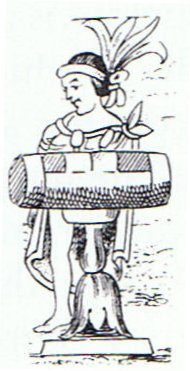
|
If the great pu in Bb11-39
should correspond to right ascension day
*49, we could put it in parallel
with
glyph number 457 in the G text:
|
Bb11-39 |
15 |
Bb12-12 |
32 |
Bb12-45 |
| ihe haki tua pu |
mai tae rutu hia i te pahu - mai tae oho te rima |
ko te henua ia kua
oti |
 |
 |
 |
|
457 (= 300 + 314 / 2) |
473 |
506 (= 590 - 84) |
|
τ Arietis (*49.7) |
Ain (*65.7) |
No star listed (*98 = 2
* 49) |
|
May 9 (*414)
→ Bharani (*41.4) |
May
25 (*430)
|
June 27 (*463) |
|
49 |
|
Tua. 1. Back,
shoulder, tu'a ivi,
shoulder blade;
tu'a ivi more,
lumbago; moa tu'a ivi
raŠ, 'sun-back
chicken': chicken with a
yellow back which shines
in the sun. 2. Behind (a
locative adverb, used
with i, ki, a, o,
etc). Tu'a-papa,
pelvis, hips. Vanaga. 1.
Behind, back, rear;
ki tua, after; o
tua, younger;
taki tua, perineum.
2. Sea urchin, echinus.
The word must have a
germ sense indicating
something spinous which
will be satisfactorily
descriptive of the sea
urchin all spines, the
prawn with antennae and
thin long legs, and in
the Maori the shell of
Mesodesma spissa.
Tuaapapa, haunch,
hip, spine.
Tuahaigoigo,
tattooing on the back.
Tuahuri,
abortion; poki
tuahuri, abortive
child. Tuaivi,
spine, vertebrś,
back, loins;
mate mai te tuaivi,
ill at ease.
Tuakana,
elder, elder brother;
tuakana
tamaahina,
elder sister.
Tuamouga,
mountain summit.
Tuatua,
to glean. Mgv.
tua: To fell, to cut
down. Ta.: tua,
to cut. Mq.: tua,
to fell, to cut down.
Ma.: tua, id.
Tuaki, to
disembowel. Ma.:
tuaki, to clean
fish. Tuavera,
the last breadfruit
spoiled by the wind.
Ta.: tuavera,
burnt by the sun.
Churchill.
Oti, To come
to an end; to suffice,
to be enough:
ku-oti-Š, it is
finished; ina kai oti
mo kai, there is not
enough to eat; he-oti
Š, there isn't
anymore left, it's the
last one; it's enough
with that. Vanaga. Ta.:
1. Oti, presage
of death. Sa.: oti,
to die. 2. To cut. Mq.:
koti, oti,
id. Sa.: 'oti,
id. Ma.: koti,
id. Churchill.
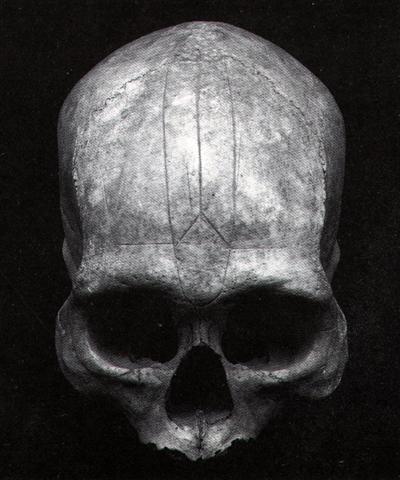 |
The star τ Arietis is at the fat
Tail of the Ram:
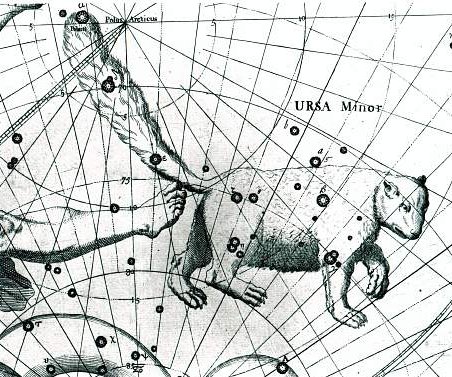
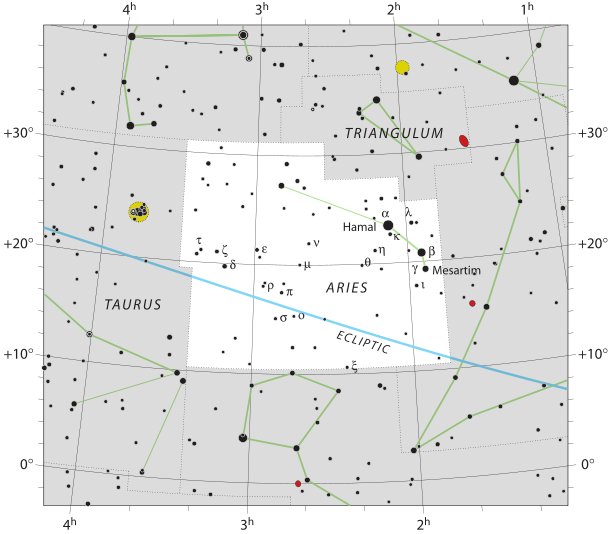
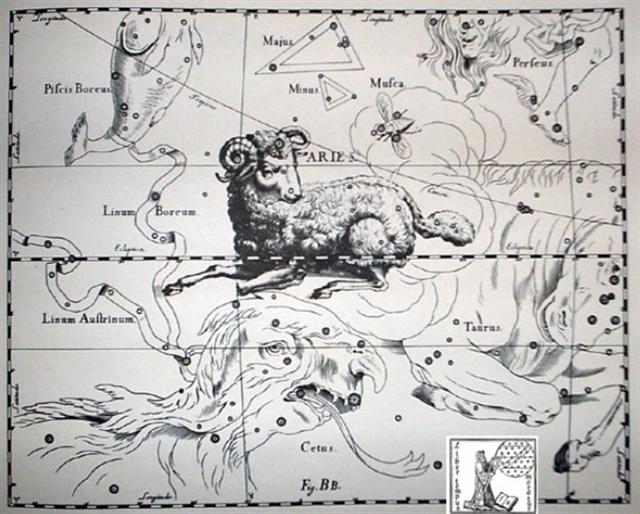
|













